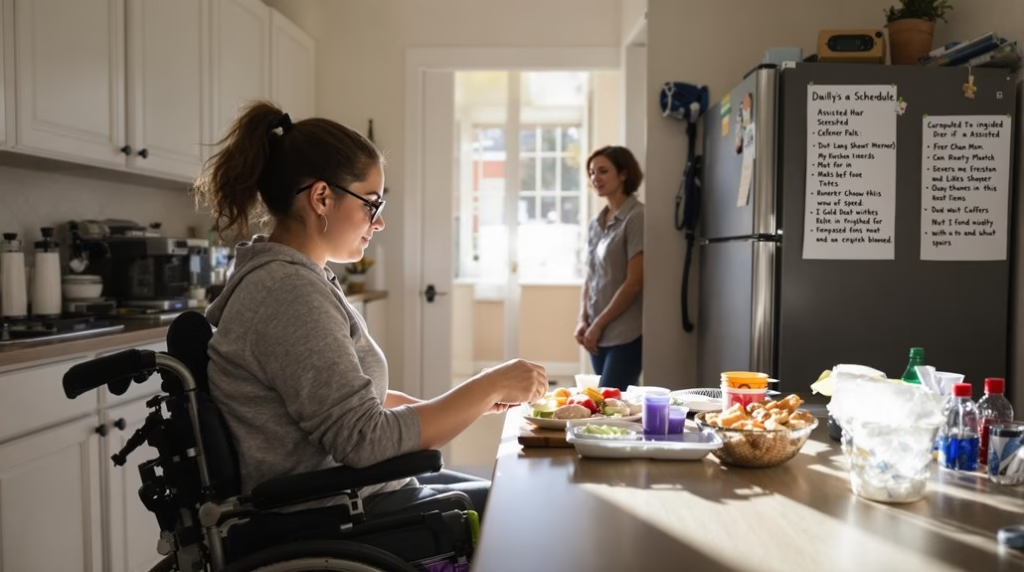Your need for 24-hour care with cerebral palsy depends on several key factors, including the type and severity of your CP, cognitive abilities, and overall medical needs. While some people with CP live independently with minimal support, others require full-time assistance for daily activities like eating, bathing, and mobility. You’ll work with healthcare providers to determine your specific care requirements and create a personalized plan that can adapt as your needs change over time.
Understanding Different Types of Cerebral Palsy and Care Needs
While cerebral palsy manifests differently in each person, understanding the main types helps determine specific care requirements.
You’ll encounter spastic cerebral palsy, which causes muscle stiffness and movement difficulties, often requiring physical therapy and mobility assistance.
Dyskinetic cerebral palsy creates uncontrolled movements, necessitating safety measures and specialized feeding support.
Ataxic cerebral palsy affects balance and coordination, demanding fall prevention strategies and occupational therapy.
Each type of cerebral palsy presents unique challenges that influence daily care needs.
Understanding and adapting to each form of cerebral palsy is essential for providing appropriate care and support.
Some individuals may require minimal assistance with basic tasks, while others need extensive support for feeding, hygiene, and mobility.
You’ll need to assess factors like muscle tone, movement patterns, and cognitive function to develop an effective care plan that promotes independence and quality of life.
Similar to Parkinson’s care, trained caregivers can provide essential support with daily living activities and mobility assistance to enhance quality of life.
Factors That Determine the Level of Care Required
Because cerebral palsy affects each person uniquely, several key factors determine the level of care needed. The severity of motor impairments directly impacts care intensity, as some individuals may need constant physical assistance while others maintain independence.
Your loved one’s medical needs, including medication management, therapy requirements, and equipment support, also shape the care schedule.
Other important factors include cognitive abilities, communication skills, and the presence of associated conditions like seizures or respiratory issues. You’ll need to evaluate their ability to perform daily tasks such as eating, dressing, and personal hygiene.
The availability of family support, access to professional caregivers, and the home environment’s adaptability also influence whether 24-hour care is necessary. Regular assessments help you adjust the care plan as needs change over time.
Medicaid home care services can provide cost-effective support for families managing cerebral palsy care needs while maintaining community connections.
Assessing Daily Living Requirements and Support Systems
Determining daily living requirements starts with a thorough assessment of your loved one’s specific needs and existing support systems.
You’ll need to evaluate their ability to perform basic tasks and identify areas where they need assistance. Consider how daily routines impact their independence and what support networks you can tap into for help.
Key areas to assess include:
- Personal care needs (bathing, dressing, toileting, eating)
- Mobility requirements and necessary equipment
- Communication abilities and assistive technology needs
- Medical care frequency and complexity
Understanding these requirements helps you create a realistic care plan that balances independence with necessary support.
You can then identify gaps in current support networks and determine whether 24-hour care is needed or if a combination of family caregivers, professional assistance, and community resources will suffice.
Non-skilled home care services can provide valuable support for daily activities while maintaining dignity and independence in the home environment.
Creating a Personalized Care Plan for CP Management
Once you’ve assessed your loved one’s needs, developing a personalized care plan becomes your essential next step in managing cerebral palsy effectively.
Through personalized assessments, you’ll create a roadmap that addresses specific mobility, communication, and daily living challenges unique to your family member.
Personalized assessments create clear pathways to address mobility, communication, and daily living needs for your loved one with cerebral palsy.
Work with healthcare providers to establish tailored interventions that might include physical therapy schedules, medication management, assistive device requirements, and specialized dietary needs.
You’ll need to coordinate with specialists, therapists, and caregivers to guarantee consistent implementation of the care plan.
Remember to include contingency plans for emergencies and regular review periods to adjust strategies as needs change.
Consider incorporating both short-term goals for immediate challenges and long-term objectives for ongoing development and independence.
Skilled home care services can provide licensed professionals who deliver medically necessary support while maintaining quality of life in a familiar environment.
Support Options: From Independent Living to Full-Time Care
Your care plan serves as a foundation for deciding the right level of support needed for someone with cerebral palsy.
The spectrum of support ranges from independent living arrangements to full-time care, depending on the individual’s specific needs and capabilities.
When evaluating support options, consider these key levels of assistance:
- Independent living with minimal support – periodic check-ins and basic assistance with specific tasks
- Semi-independent living – regular support for daily activities while maintaining personal autonomy
- Assisted living facilities – structured environment with on-call professional help
- Full-time care – thorough 24-hour support for complex medical and personal needs
You’ll need to regularly assess and adjust the level of support as needs change over time.
Working with healthcare providers and support specialists helps guarantee you’re choosing the most appropriate care arrangement for your loved one’s wellbeing.
Skilled nursing care provides essential 24/7 medical monitoring and medication management for those requiring comprehensive support.
The Role of Caregivers and Healthcare Professionals
Successful care for individuals with cerebral palsy relies on a coordinated team of caregivers and healthcare professionals working together.
You’ll need to work closely with physical therapists, occupational therapists, speech pathologists, and medical specialists to guarantee all-encompassing care and ongoing progress.
Healthcare collaboration is essential as you coordinate between different specialists, schedule appointments, and implement recommended treatments and exercises at home.
If you’re a primary caregiver, you’ll need to monitor medication schedules, assist with daily activities, and maintain detailed records of progress and challenges.
To prevent caregiver burnout, you should establish a support network and consider respite care options.
Building a Long-Term Care Strategy That Adapts Over Time
Building an effective long-term care strategy for cerebral palsy requires regular assessment and adaptation as needs change throughout life.
You’ll need to take into account how your loved one’s evolving needs impact daily routines, mobility requirements, and therapeutic interventions.
To create adaptive strategies that work long-term, focus on these key areas:
- Physical therapy adjustments based on changing mobility patterns
- Communication tools that grow with cognitive development
- Home modifications that accommodate different life stages
- Support services that scale with increasing or decreasing independence
Remember to document changes in abilities and challenges, as this information helps healthcare providers fine-tune treatment plans.
Regular meetings with the care team guarantee your strategy remains responsive to new developments.
Conclusion
Every person with cerebral palsy has different needs, just like every star in the sky shines its own unique light. Some people might need someone by their side all day and night, while others may only need a helping hand now and then. Think of care needs like a journey – they can change over time, and that’s perfectly normal.
Working with doctors and care teams is like having a compass to guide you toward the right amount of support. Whether someone needs a few hours of help each day or care around the clock, the goal is simple: helping them live their best life possible.
Remember, you’re not walking this path alone. Many families face similar challenges, and there’s always a caring hand ready to help. Focus Family Care understands your journey and stands ready to support you every step of the way.
If you or a loved one need help, don’t wait. Reach out to Focus Family Care today at (561) 693-1311 or email us at info@focusfamilycare.com.





